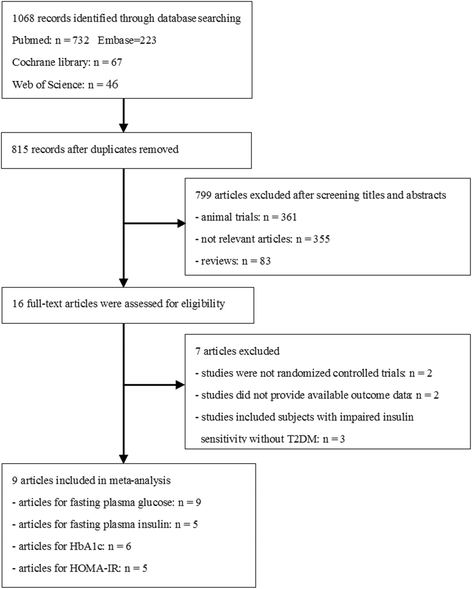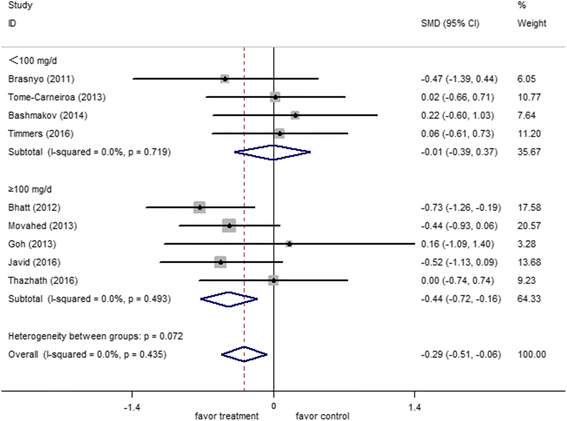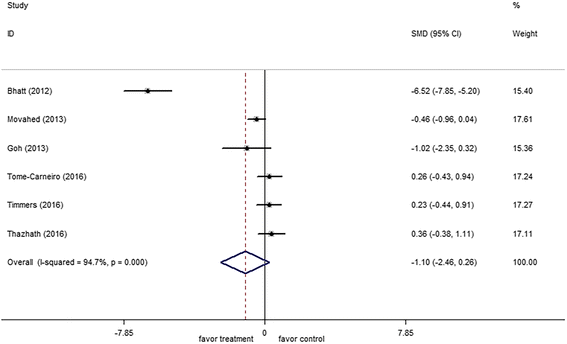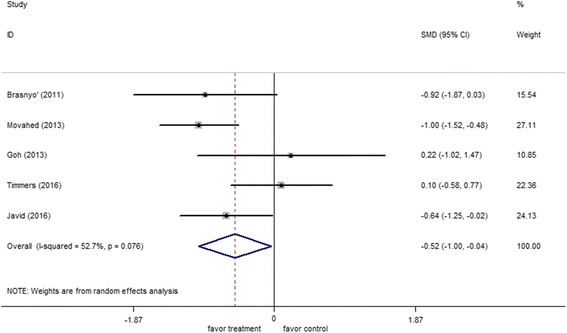Effects of resveratrol on glucose control and insulin sensitivity in subjects with type 2 diabetes: systematic review and meta-analysis
- PMID: 29018489
- PMCID: PMC5610395
- DOI: 10.1186/s12986-017-0217-z
Effects of resveratrol on glucose control and insulin sensitivity in subjects with type 2 diabetes: systematic review and meta-analysis
Abstract
Although the regular consumption of resveratrol has been known to improve glucose homeostasis and reverse insulin resistance in type 2 diabetes mellitus (T2DM), the reported results are inconsistent. Thus, we aimed to assess the effects of resveratrol on glycemic control and insulin sensitivity among patients with T2DM. We searched for relevant articles published until June 2017 on PubMed-Medline, Embase, Cochrane Library, and Web of Science. Randomized controlled trials in T2DM patients administered with resveratrol as intervention were included. After study selection, quality assessment and data extraction were performed independently by two authors, and STATA and RevMan software were used for statistical analysis. Nine randomized controlled trials involving 283 participants were included. Meta-analysis showed that resveratrol significantly improved the fasting plasma glucose ( -0.29 mmol/l, 95% CI: -0.51, -0.06, p < 0.01) and insulin levels (-0.64 U/mL, 95% CI: -0.95, -0.32, p < 0.0001). The drug also reduced homeostasis model assessment of insulin resistance (HOMA-IR) index, systolic blood pressure, and diastolic blood pressure among participants with T2DM. The changes in hemoglobin A1c (HbA1c), low-density lipoprotein cholesterol, and high-density lipoprotein cholesterol were negligible. Subgroup analysis comparing the resveratrol supplementation doses of < 100 mg/d versus ≥ 100 mg/d revealed a significant difference in fasting plasma glucose. In particular, the latter dose presented more favorable results. This meta-analysis provides evidence that supplementation of resveratrol may benefit management of T2DM.
Keywords: Meta-analysis; Resveratrol; Type 2 diabetes.
Conflict of interest statement
Ethics approval and consent to participate
Not applicable.
Consent for publication
Each author meets the criteria for authorship and assumes the corresponding responsibility.
Competing interests
The authors declare that they have no competing interests.
Publisher’s Note
Springer Nature remains neutral with regard to jurisdictional claims in published maps and institutional affiliations.
Figures




References
Publication types
LinkOut - more resources
Full Text Sources
Other Literature Sources

